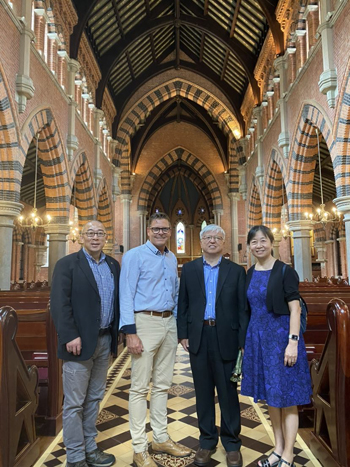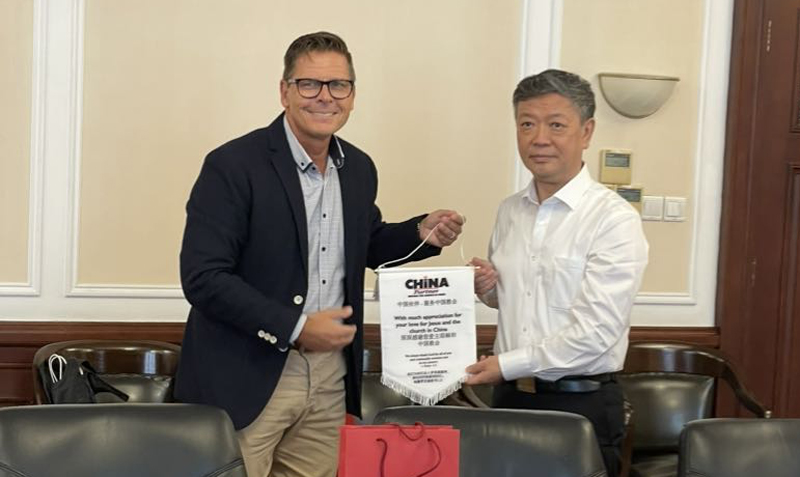By Mark Ellis –

President Xi Jinping has tightened his grip on the church in China, imposing restrictions that most would find objectionable in the West, yet God’s grip on His church is infinitely stronger, and a living faith is richly evident — even in the registered church.
Erik Burklin’s grandparents were missionaries in China for 25 years with China Inland Mission, founded by Hudson Taylor. The family was forced to leave following the communist revolution in 1949. Erik’s father, Werner, was allowed to re-enter China when it re-opened to the West in the 1980’s, and by 1991 he made a strategic choice when he launched their ministry, China Partner, to work exclusively with the official registered church.
“When my father started the ministry, he was severely criticized for that,” Erik, president of China Partner, recounts. “The country is run by the Communist Party, and yet within the system, it’s quite remarkable how God is using faithful believers and church leaders and pastors to advance the gospel in their context.”
Erik recently visited three cities in China, his first trip since the pandemic. “There are about 50,000 different registered churches throughout China. A lot of these pastors have very warm relationships with house church pastors. or unregistered church pastors. Many times, they work together. A lot of their congregants will go to a house church during the week, but then on Sunday, they like to be in a church building, and usually those are registered churches.
“There’s lots of overlay, back and forth,” he notes.
During his time in Shanghai, Erik met with Rev. Wu Wei, the president of the China Christian Council, which shares headquarters and is affiliated with the Three-Self Patriotic Movement (TSPM). Rev. Wu studied in the U.S., led a Chinese church in Kentucky, and Erik considers him an evangelical.

“We asked him a lot of questions about the Sinicization that Xi Jinping is pushing right now, trying to make all religions more Chinese. They want to make sure that all the people respect and honor Xi Jinping and the party.”
Rev. Wu explained that he views this as a positive because it allows them to be more proactive sharing the gospel in a way that is not Western, but more Chinese. “Rev. Wu said, ‘We know that Christ is the foundation of the church and salvation to the Chinese people only comes through Him.’
Erik was encouraged by that admission. “That was a very key statement for him to make. They, so to speak, kowtow to this push of Sinicization from the government, but at the same time, and more importantly, they’re actually using it to reach their country for Jesus Christ. They know that salvation only comes through Jesus and through the word of God and by preaching the word of God.”
Erik recalls a Youth for Christ slogan, (Erik used to serve on staff with that youth outreach organization for 11 years before he started with China Partner), “Anchored to the Rock, and geared to the times,” which seems to be the essence of Rev. Wu’s approach. “He said we need to be anchored to the foundation of the truth, which is Jesus Christ and His Word. But he said we also need to be sensitive to the culture that we are finding ourselves in, which is the Chinese culture. And part of Chinese culture is living within a communist ideology. That’s not ideal, but God has placed us here for a purpose to spread the Gospel and to be faithful to Him.”
A picture of Xi Jinping is now displayed in many TSPM churches, but that should not be misinterpreted. “The believers in those churches don’t worship him but respect their president,” Erik says. “One pastor told me, ‘Yes, whenever we pass by the picture of our president we pray for him.”
Another highlight of Erik’s trip was meeting a Christian scholar, Dr. Jenny Zhao, who teaches Old Testament at the Zhongnan Theological seminary in Wuhan. “She just got her Doctor of Ministry degree from a seminary in Taiwan, so here’s a mainland Chinese Christians going to Taiwan to get their education and come back.” Zhao has been working on an Old Testament commentary at the request of the China Christian Council.

Erik thinks many believers in the U.S. harbor an incorrect view about the availability of Bibles in China. “I think the biggest misconception by evangelical Christians around the world is that you still have to smuggle Bibles into China. The Amity Printing Company, located in Nanjing, has printed over 200 million Bibles since 1987,” he noted.
After his meeting with Rev. Wu, Erik visited a Christian bookstore in Shanghai attached to Holy Trinity Church, a Protestant Anglican Church built in the 1920s. “We walked into this bookstore, and they have a cafe in there. There is a terrace where people can come and sit and read and drink a cup of tea. They gave us a little book that has the history of the Bible in China.”
Amity Printing has published 150 versions of the Bible, including the Union Bible, the King James Bible. the New King James Bible, a New Revised Standard Version, and the English Standard Version (ESV).
There are no restrictions about the purchase of Bibles, according to Erik.
He asked Dr. Jenny Zhao about recent news reports about the communist government attempting to re-write the Bible. “She just laughed. She said, ‘They could never rewrite the Bible because the Christians know the Bible so well, they would reject any changes to any passages.”
The most troubling aspect of Sinicization by Xi Jinping is that anybody under the age of 18 is not allowed to come to church. The China Partner team was told that in some cities there are now people from the Religious Affairs Bureau making sure that minors cannot enter a church building. “That’s a major change that’s not very nice,” Erik observed. There are less young people applying to go to seminary or Bible school. So that’s a negative trend.”
“In spite of these new regulations,” Erik continues, “the miracle is that Christian parents still teach the Bible in the privacy of their homes and sing songs with them, and many children come to faith before they’re 18 because the parents are Christians, or the grandmother is a Christian. I’ve heard testimonies of people who say they became a believer through their grandmother after she invited them to church. They heard the gospel and accepted Christ.”
The government control may seem overwhelming to many looking in. “Everybody’s very nervous because of Xi’s rule and his authoritative demeanor,” Erik said. “And what we have to understand is that God holds his heart in his hand (Proverbs 21:1), and He can change his heart anytime he wants. And the Chinese church believes the same thing. They don’t worship Him or their party, but they respect him as their leader.”
“The government knows everything,” one church leader told Erik. “So stop calling it the underground church. They’re all known by the religious affairs people.”
Erik concurs with that assessment. “The difference is that many pastors choose to not register because of their theological convictions and therefore are deemed illegal. And that’s where it gets very challenging at times because the government knows about their activities and would prefer for them to register.
“Some years back, we visited an unregistered church in a major city which had rented two floors in a high-rise building. They had a Christian bookstore, a café, rooms for kids ministry and youth group activities. It included a huge auditorium. This church isn’t “underground”, it operated very openly.
In one sense, Sinicization fits a pattern established by Hudson Taylor, Erik believes. “Taylor Sinicized himself. He grew long hair, he grew a beard, he wore Chinese looking clothes. That was his way of attempting to be more Chinese. But the Gospel that he shared was the same. The Bible that he preached from was the same. That’s what the Chinese church is doing.”
“There’s believers in China that love Jesus very much, that read the Bible, that declare His word every Sunday, whether they’re found in the unregistered church or the registered church. They live in a communist controlled system and they have to deal with that.”
Church attendance suffered during Covid and has not completely recovered. “They are at about a 75% level now,” Erik says. “They really have been challenged. One church had to shut down five times over the last four years.”
“I’m so humbled that in the midst of all this control, in the midst of their limited freedom, they stay faithful. These pastors keep preaching the word of God on Sundays. They have baptisms every year. They graduated 1200 new seminary and Bible school students from 22 different seminaries and Bible schools in China this year. They will be serving in the local churches.”
Original Story posted here


